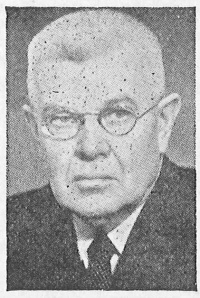If this site was useful to you, we'd be happy for a small donation. Be sure to enter "MLA donation" in the Comments box.
Janzen, Jacob H. (1878-1950)
Mennonite Weekly Review obituary: 1950 Feb 23 p. 1
Birth date: 1878
text of obituary:
Well-Known Bishop of Ontario Church Died February 16
SERVICES HELD AT WATERLOO LAST SUNDAY
FOR DR. J. H. JANZEN
Funeral services were held at the United Mennonite church of Waterloo, Ontario last Sunday afternoon for Dr. Jacob H. Janzen, widely known bishop and elder of the church who passed away at 4:00 a.m. Thursday, Feb. 16. He had been ill since Dec. 21, 1949.
The funeral services were preceded by a memorial service at the church in the forenoon.
Dr. Janzen was widely known in U.S. and Canadian communities through his activities as a Bible lecturer and writer on both secular and religious subjects. He was ordained bishop and elder of the United church in 1926, soon after his migration to Canada from Russia, and continued to serve the congregation in the capacity of elder emeritus following his retirement.
Taught in Russia
Born at Steinbach in South Russia, he was educated in Mennonite schools there and qualified as an elementary teacher by self-instruction. He later qualified as a high school teacher, and was an instructor in the Ohrloff Girls’ high school, Tiege, from 1908 to 1921.
He was ordained to the ministry at the Gnadenfeld church in Russia on Nov. 19, 1906, and later served the Melitopol church for a number of years. Several years ago the honorary Lit.D. degree was conferred on him by Bethel college.
Dr. Janzen married Helene Braun on Aug 15, 1899. following her death, he was married to Eliese Reimer-Neufeld, who survives him, along with a number of children and grandchildren.
See last article by Dr. Janzen on page 7.
The Mennonite obituary: 1950 Mar 7 p. 151
text of obituary:
by C. Krahn
Death has removed the pen from the untiring hand of J. H. Janzen, and his lips have been sealed for this life. To many, in both the old and new world, he has ministered as writer, as teacher, and as pastor. On February 16, 1950, he was taken from our midst.

J. H. Janzen was a fearless seeker of truth — the Christian truth. We common people, having chosen or having been chosen for a calling in life, usually manage to say mostly those things which are advantageous to us and our chosen field. We quickly develop a sense for things which are "proper." J. H. Janzen too possessed this faculty, but there was another one more important to him — the desire to seek the truth and to express it with little regard as to whether it would mean for him a personal gain or a loss and whether it would be in harmony with that which is usually expected of a minister. A year ago he wrote:
"Nimmer erlösche dein Hunger nach Licht.
Waharheit siegt, drum verzage nicht!
Lass dir den Glauben nicht rauben!"
In Russia, Janzen had been a teacher and was elected into the ministry. By the time he came to Canada, 25 years ago, he had established himself as a writer, a field in which he was a pioneer. Mennonites being tillers of the soil have produced few writers. Among those that will be remembered by future generations J. H. Janzen will be prominent.
Arriving in Canada at the age of approximately 45 he acquired mastery of the English language more readily than most people in a similar situation, and was thus enabled to serve repeatedly in various Mennonite congregations in the United States and write his articles in the English language. thus he became well known and beloved by many. His last lecture tour in the United States was made a year ago when he served, as he had done before, at the Bethel College Bible Week.
The ease with which he learned the English language is only one demonstration that he remained an inquirer and a learner all his life. He remained young in spirit and was therefore understood by the young — a born educator. One only wishes that a man with his talents could have devoted his time and energy without constant struggle to earn his daily bread. The articles which he was sending to the editors of our papers up to the last day of his life illustrate that he was a hard worker. Janzen was ready to be called home by his Lord an Savior in whom he trusted in childlike faith, but he was not ready to "retire' as long as he could labor. In one of his last poems he expresses his readiness and his farewell as follows:
Der Winter treibt sein rauher Spiel,
Mir ist's zu kalt. Mir wird's zu viel!
Der Wintersturm heult hohl.
Lebt wohl!